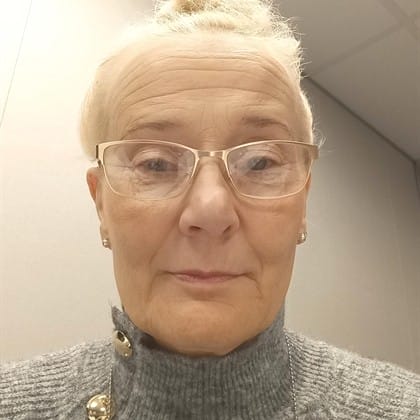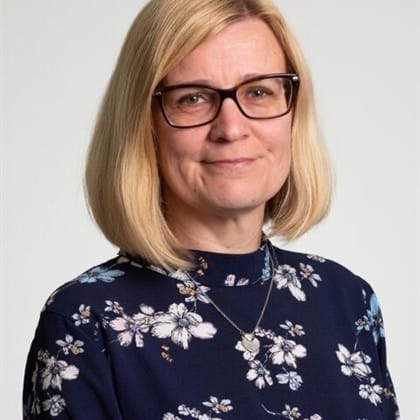


The Finnish Education Evaluation Centre (Karvi) has audited SAMK. The quality certification is valid for six years as of March 16, 2022. SAMK also has an ISO 9001:2015 compliant certificate, granted by the DNV Business Assurance Management System Certificate.
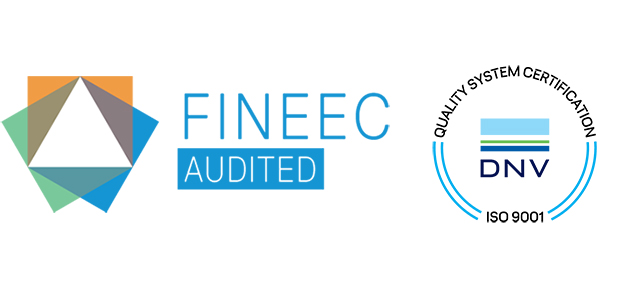
The quality system of Satakunta University of Applied Sciences, the Quality Manual, guides and supports every actor at SAMK to implement his/her work according to the strategy and objectives towards a mutual vision.
The quality system is based on valid ISO9001:2015 and ISO9004 standards. In addition, Maritime Education in SAMK complies with the requirements set out by the International Convention on Standards of Training, Certification and Watchkeeping for Seafarers (STCW 2010 including Manila Amendments).
SAMK’s quality system is described with the PDCA cycle known as the Deming circle. External and intern operating environment together with the client needs give contents and direction for the operation guiding the choice of focal points. A fundamental part of the operation is continuous development based on feedback and assessment information.
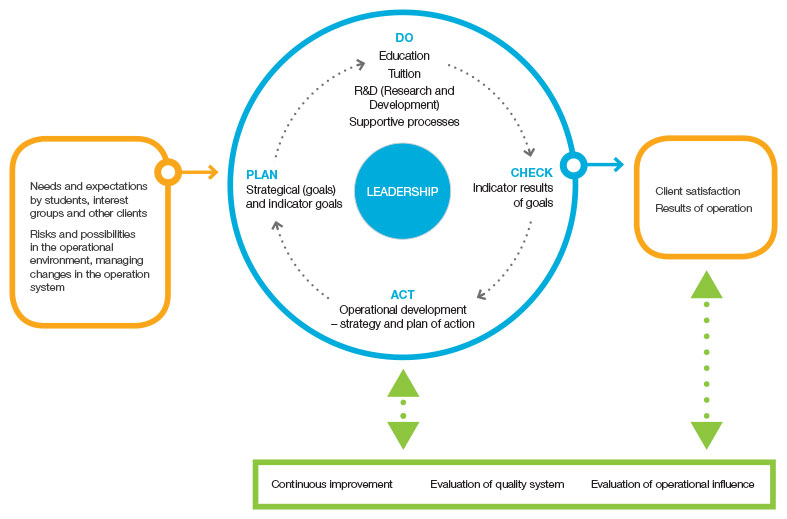
In accordance with the defined Quality policy, the operations in SAMK are client-oriented. Clients of Satakunta University of Applied Sciences comprise those quarters and groups that use SAMK’s services. Internal clients using the services are the students and personnel, and external clients are companies, communities and citizens using the services.
Methods to find out the students’ needs are the study feedback system, student enquiries and student participation in development groups and decision-making bodies through student representatives. The client needs of companies and communities are examined a.o. by following competence needs, by participation of working life representatives in SAMK’s administration and degree programmes’ advisory boards, and by a tight interaction between SAMK’s personnel and working life companies and communities. The members of the advisory boards can be found in intra.
SAMK is an active partner in developing the companies and communities in this region. The main developing tools are further education as well as research and development projects. Anticipating educational needs is of importance when planning the quantity and contents of education. SAMK participates also in regional development of anticipating educational needs. SAMK is also involved in the development of a regional procedure for anticipating training needs. Regional development prospects are reviewed twice a year in a regional panel of the Satakunta ELY Centre (Centre for Economic Development, Transport and the Environment). The/this regional foresight forum is organised annually on a thematic basis. The panel is made up of representatives from the municipalities in the region, educational institutions, Technology industries of Finland, ELY Centre, Prizztech Ltd, the Chambers of Commerce, the Regional Council of Satakunta, Satakunnan Yrittäjät and the TE Services(Employment and Economic Development Office).
Management of risks and possibilities refers to systematic definition, preparedness and respect of large-scale negative or positive events (risks or possibilities) when making decisions.
A comprehensive risk management is a part of SAMK’s good governance. It is the leaders’ responsibility to make sure that SAMK recognizes and manages risks which could prevent it to reach its goals.
Risk management and internal control is implemented by the whole organization, including the board, management and the entire personnel. Responsibility for risk management and internal control lies in the hands of SAMK’s top executives. Arranging intern control and risk management is a part of SAMK’s leadership. The managers define the course of action and the guidelines with which the aims and goals based on the strategy can be reached.
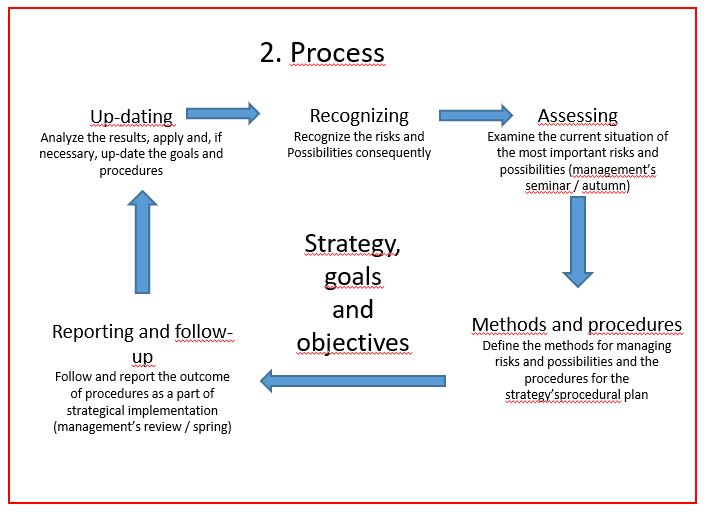
Risk management is a part of efficient and functioning management. External risks and opportunities are considered in the light of changes in the external operating environment. Risk management is observed comprehensively. i.e. all risks affecting the operation of SAMK are examined irrespective of where they result from. SAMK wants to develop and implement risk management systematically throughout the whole organization and give instructions for actions on how to implement the principles of risk management. The instructions and framework for risk management define the processes and courses of action of risk management, but the management of SAMK is responsible for their practical implementation.
Internal control includes all the internal procedures and operation modes, which help in assuring the legality and profitability of operation.
Internal control is described as a process, which helps in assuring that the goals of the organization are met. The goals are classified into four categories:
Internal control consists of all the measures and procedures, which help in reaching the goals set. Internal control includes the organizations internal operating environment, goal setting, risk management, control actions, flow of information and communication as well as follow-up.
Internal audit evaluates the appropriateness and effectiveness of internal control system and risk management. Internal audit helps SAMK to develop and evaluate its effectiveness in the fields of risk management and control, management and administration processes.
Internal audit follows the operating instructions for the internal audit confirmed by the Board of SAMK for the audit process.
Risk management annual calendars are drawn up yearly based on long-term outlines. The Board is given an annual report on the organizing of internal control and risk management and their functionality based on realized evaluations, and the development of operation. An annual report is compiled of operation, on the basis of which a report on risk management is drawn up for the financial statements´ annual report.
An action plan for internal audit is drawn up for a calendar year at a time. The audit is yearly directed to areas, which at a given time are considered important for the goals of SAMK and the evaluated risk. The updatedness and appropriateness of the action plan are scrutinized by the management every six months. Internal audit coordinator acts under the Managing Director.
The coverage and coordination of audit activities are assured by regular contact and information exchange between other internal assurance activities and auditors. If necessary, external outsourced services are used by internal audit for temporary additional resourcing or for implementing evaluation duties that need special knowhow. In these cases, external service providers act under guidance of internal audit coordinator.
A written report is prepared on each audit to be distributed to the Managing Director and the management of the activity or unit audited. Audit reports are brought to notice for auditors and at the discretion for those parties that are considered justified according to the contents of the report. Internal audit draws up a biannual summary report for the Managing Director on the audits taken, the most significant observations and the measures agreed upon. An annual report is drawn up for the Board on the activities of internal audit.
SAMK is an educator, developer, internationaliser and promoter of entrepreneurship in the region. SAMK profiles itself as an industrial university. SAMK operates according to commonly agreed values and delivers results together. SAMK maintains a culture that encourages experimentation and enables expectations to be exceeded. It emphasises the responsibility of each individual.
Educational responsibilities of Satakunta University of Applied Sciences are based on regional analyses of economic structure and competence needs. The Council of State has granted SAMK a concession (OKM/23/533/2013) to practise education on six educational fields: culture and arts, business administration, hospitality management, social services and health care, technology and maritime technology.
Concerning the educational responsibilities, the Ministry of Education and Culture has defined the titles and extents for the granted degrees as well as the target titles for applying for educational responsibilities.
Flexible learning paths require diverse and alternative teaching methods and seeing the importance students’ guidance as a holistic, comprehensive process. Every member of the staff recognizes their role as a tutor for students, and tutoring is seen as an activity supporting both teaching and learning as well as professional growth when thinking with a wider perspective. Course design supports methodological solutions which identify and recognize competences already acquired or to be acquired. This can be traditional recognition of prior learning or, for example, student-led studification of work or competences acquired in recreational activities. The development of teaching methods supports the realisation of the objectives of continuous learning in the UAS.
Education is offered as full-time studies at daytime and as multiform studies. The education is divided into degree studies, continuing education sold for companies and communities and open UAS studies. In education leading to a degree a Bachelor’s Degree (basic degree) and a Master’s Degree (higher degree) can be taken.
In addition, specialized education can be offered after a university degree to people already at working life. This education is aimed at professional development promoting specialization to create know-how in such expert areas which don’t have market-based supply of education.
Based on anticipation information and competence survey for companies, professional further and continuing education is implemented to meet the needs of working life, as well as development projects increasing the know-how of staff in companies and communities. Professional continuing education and other development projects are implemented either for the needs of a single company or community or more widely for a specific professional group or field.
Through so called partnership agreements with the most significant co-operation companies and communities a long-term collaboration is enabled to develop the company’s or community’s competence base. Through this partnership the company has all the tools SAMK has at their disposal: research operation, project co-operation, co-operation between students and companies, slow recruiting (practice and thesis), fast recruiting, degree education for the staff and targeted company education.
Pedagogical methods based on problem solving, development from everyday knowledge to expertise and coordination are used at Satakunta University of Applied Sciences. The pedagogical models implement learning in interactive situations by experimenting, exploring and developing. Tuition, study arrangements and developing the methods of evaluation support the student’s effective and flexible progress. Learning environments close to working life and building networks are seen as factors promoting the student’s professional growth during studying.
To experience learning as purposeful and meaningful is essential in the university of applied sciences. Pedagogical work and the perception of learning are based on the idea of a learner who along with one’s development of knowledge and skills during studying also builds one’s own professional identity of working as an expert. The student is an active and responsible actor in his/her growth of knowledge and skills and in their self-evaluation. The learning targets in the university of applied sciences are both the contents of the subject matter and its application as well as skills in search of information and critical handling of information, and an ability to show one’s knowledge in a way the learning situation and working life expect.
Project activities and research and development are linked with the studies, and they will deepen as a part of the thesis process at the end of the studying. The basic readiness for research and development activities is seen as professional, university level qualities of a student graduating from the university of applied sciences.
Processes connected with tuition are described at the ARC system, where you can log-in with the SAMK code.
The focus activities are described more closely at the ARC system, where you can log-in with the SAMK code.
The supporting processes at SAMK are divided into quality management, human resources, financial management and ICT services.
The quality management processes include initiative, feedback and complaint procedures as well as the internal auditing processes.
Recruitment and orientation of personnel, conduct of development discussions, international staff exchange, travelling and assessment performance appraisals, international staff mobility, travelling and the assessment of job-related risks.
Financial management processes include purchases, and ICT service processes project and implementation of the new information system as well as the administration of access rights to the systems.
Acquisition and introduction of a new information system as well as the administration of the systems’ access rights are described of the ICT service processes.
The central supporting processes at SAMK are described at the ARC system, where you can log-in with the SAMK code.
One SAMK’s strategic goals is to be a competent and healthy higher education community, and the defined quality goal is to achieve good job satisfaction among the staff. As a workplace SAMK is safe, healthy and productive for every employee. Well-being at work is a matter concerning the whole work community and it means that work is meaningful and seamless in a safe, healthy and career-supporting working environment and community. Both the employer and the employee have the responsibility to maintain and develop well-being at work. In addition to management and employees, essential players in this work are people responsible for health and safety at work, shop stewards, the department of human resources as well as occupational health care. More information on well-being and health and safety at work can be found in the staff intranet.
The development of well-being at work is supported at SAMK by several programmes and guidelines, such as
These programmes are available on the intranet and are regularly updated.
In accordance with its Quality policy, SAMK consciously strives for high quality in its operations, and strategic management is based on continuous evaluation.
At SAMK, knowledge management means up-to-date decision-making based on high-quality information. The achievement of SAMK’s strategic goals is controlled by systematic monitoring of the programme of measures. The indicators set for the goals are based on quantitative data, which measured from the ‘outside’ and which measures and explains the success or failure of qualitative activities. The qualitative goals are thus operationalised in a quantitative, measurable form.
In SAMK’s quality goals it is specified that the staff should be able to identify their own work as part of the overall operations at SAMK. The evaluation one’s own performance and the use and management of the obtained evaluation information together with the staff are condidered natural processes at all levels of SAMK.
SAMK’s management follows systematically the achievement of quantitative goals with the mittarit.samk.fi, which has an alarming system concerning the goals. The personnel can also follow achieving the goals by logging in with the SAMK code into the QPR system.
The Deans follow regularly the level of achieving goals and the results of the operation are looked through at the team meetings.
The web page Vipunen, published by the National Board of Education, shows the performance level of each university of applied sciences regarding the financing indicators. For the management’s survey, SAMK delivers reference data of the situation compared with other universities of applied sciences.
Qualitative feedback from the students, alumni and collaboration partners is received through different enquiries and surveys by SAMK. These surveys are registered into SAMK assessment programme (which needs log-in). The qualitative feedback is discussed also in the annual survey by the management.
According to #Our SAMK strategy, SAMK has the responsibility to produce customizable competence to meet the needs of modern and multidisciplinary working life in the region and neighbouring areas, as well as in chosen fields all over Finland. This requires a culture of experimentation in both research and teaching.
SAMK has a comprehensive selection of work-based and multiform degree and continuing education entities. SAMK is also a uniting force for the working life, education and research cooperation in the region with result-based operations ensuring flexibility and adaptability. SAMK is committed to working as the engine for innovative operations, internationality and entrepreneurship in the region. SAMK research centers are the RoboAI Research and Development Center, the Business Intelligence Center BIC, the Maritime Logistics Research Center, the Research Center WANDER, the Center for Tourism Business Development and the Research Center for Human Functioning.
The focus areas defined in the SAMK’s stragegy as such where
SAMK is systematically developing the competence of the organization, and also evolves constantly by promoting the integration of international students, teachers, researchers and other experts to the community. A culture that improves well-being is built together with the students and the staff, and the well-being of the students and the staff are also monitored regularly.
SAMK strategy defines focus areas, cross-cutting strengths and emerging areas.
The objectives following the strategy have their own procedures, which can be found at the ARC-system.
The fundamental pillars for directing operation at SAMK are
Quality management and quality control aim at efficient leadership and achievement of set goals. Management and maintenance of a quality system are seen as one and the same process where the commitment of the managers is the most important thing.
We are building corporate culture when learning how to cope with externally challenging conditions, simultaneously learning internal cooperation. Corporate culture is the result of operations. Corporate culture that is systematic, stemming from the strategy, led by the company and the employees together supports the implementation of the strategy and facilitates leadership. Developing corporate culture in a way that supports the strategy is meaningful. Corporate culture becomes a part of strategic directing of operations.
Rewarding is an important part of directing operations. The reward system of SAMK 1) strengthens our community and rewards for common achievements, 2) encourages to develop joint activities and innovations and 3) acknowledges basic work and notices everyday successes.
Quality system ISSO9001:2015 supports leadership and business activities. Documentation has been given new freedom in the revised standard, which facilitates the integration of different systems.
In compliance with enterprise architecture, SAMK relations to systems, technology and information have been described. The core systems of directing operations are included in the description of enterprise architecture (ARC).
SAMK strategy defines focus areas, cross-cutting strengths and emerging areas. The measures that have been drawn up for the strategic goals can be found in Planner (Office365) > SAMK Strategy Programme of Measures 2021-2024. The realization of the measures and the operational effectiveness are followed regularly.
Operation at Satakunta University of Applied Sciences aims at the satisfaction of individual, company and community clients. The starting points for the operation are a controlled customer-friendly planning and implementation of research, development and innovation. To ensure this, SAMK gathers client and interest group feedback of its operation and results.
The assessment programme describes the methods for follow-up, feedback and assessment concerning the clients and interest groups. The most essential methods are
Students
Companies, communities and alumni
SAMK’s role and importance in the region has grown significantly over the past five years. In line with its strategy, SAMK has become a uniting force for the working life, education and research cooperation in the region. SAMK will be invited to participate in practically all cooperation networks in the region. By the trust and reputation gained in international project activities, SAMK’s international networks are growing through being invited in the similar way.
SAMK’s project activities have seen a significant increase in the number of joint projects between higher education institutions. In addition, the share of international joint projects in the project volume is significant.
The entrepreneurship of SAMK’s students and staff is seen as a resource and a generator of renewal for both the university and regional development.
Enterprise Accelerator™ serves not only the university community but also all entrepreneurs in the region. The accelerator also acts as an activator, sparring partner and investor in the start-up field.
In following the Quality policy, the activities at SAMK consciously strive for high quality and continuous improvement.
In line with the Quality policy, SAMK maintains a quality system that supports the high quality of its basic tasks.
Operation at Satakunta University of Applied Sciences is assessed systematically throughout the year. Dealing with different activities in the Management Group and in the Joint Committee is structured into a special yearly calendar which can be found under Quality at Tweb-system (needs log-in).
The extended SAMK management, including besides the Management Group also Heads, Team leaders, representatives for Occupational Safety and the Joint Committee, participates in planning and evaluating the operation in a meeting twice a year. In the spring meeting the theme is to assess and up-date the strategy’s operational programme, and in the autumn meeting to survey the needs and expectations of the interest groups, as well as to manage changes and risks in SAMK’s operational environment.
Managing risks and possibilities and internal supervision are developed based on implemented assessments and self-evaluation. Self-evaluation and implementation of procedures are assessed, according to the yearly plan, in the management’s survey in the spring to ensure implementation of procedures improving quality.
The functionality of the entire quality system guiding SAMK’s operation is assessed in the management’s surveys. In the survey the Management Group evaluates and analyzes the quality policy and its objectives together with the results SAMK has achieved at an administrative unit level as well as a national level. The influence of the operation is also assessed by making a root assessment based on the external and internal audit results. The auditing observations, further procedures based on them and the surveys can be found under Quality at TWeb (needs log-in).
After the management review, a management seminar is held to communicate the results of the review to the heads/managers of units, who then take the matters to their administrative units for information and discussion. The seminar serves as a channel for interaction between management and heads/managers and can be held in both spring and autumn. The purpose of the seminars is to provide management with tools to support continuous development and to give heads/managers tools to implement their management work in accordance with SAMK’s common guidelines. The seminars also provide an opportunity to share good practices among the heads of teaching and research.
The entire strategic planning and development operation at Satakunta University of Applied Sciences is the responsibility of the Managing Director supported by the Management Group, including the Vice-President, Director for Finance and Administrative Services and the Faculty Deans. In the administrative units the development activities are the responsibility of each Dean in accordance with the strategy. In addition to these, the development of the educational process is the responsibility of the Management Group of Education and the development of the RDI operation plus student entrepreneurship is the responsibility of the Management Group of Research. The detailed description of the responsibilities of these managing groups can be found in the Operational Instruction and the members of the groups can be found in Intra.According SAMK’s Quality policy, maintaining high quality is also the responsibility of every member of staff. Each employee at SAMK participates in developing the operation through their own duties.
There are seven development teams at SAMK: Accessibility Development Team, Education Development Team, International Operations Development Team, Quality Management Development Team, Studying and Welfare Development Team, Sustainability and Responsibility Development Team and Thesis Development Team. The members and the tasks of the groups can be found in Intra. The members of the Quality Group act as quality coordinators and their job descriptions can also be found at Intra. In accordance with the quality goals for teaching at SAMK, students participate in the development of teaching. Students are represented in every development team, as well as in the Management Team of Education.
According to Quality policy, the development of activities is based on continuous evaluation. Continuous improvement is based on information from both quantitative and qualitative indicators, which are used to measure SAMK’s performance. Students’ prior knowledge, experience and understanding are relevant in learning situations. The goal of education is that the development of one’s own skills becomes an important part of the student’s life and a practicable skill also after completinig the UAS degree.
The information on both quantitative and qualitative indicators is the basis for continuous development seen in the assessment program, which evaluates operation at SAMK. In the annual survey of the Management Group the achieved results are assessed and analyzed.
In addition to external certification audits, SAMK conducts internal and external audits every year.
Internal audit targets are selected based on the strategy or, for example, on KARVI’s audit reports on higher education institutions or on KARVI’s audit manual for preparing audits.
Risk management
The SAMK Management Group and the director responsible for risk management are responsible for developing the operation. Essential areas needing development according to the reports to the Board and the reports of risk management and internal inspection are systematically considered in developing the operation. The observed and the high-lighted development targets by the assessment are set as the target-oriented themes for the annual plan of risk and possibility management for the following year.
SAMK emphasizes including risk management as a part of all usual processes. Risk identification is implemented for each administrative unit or faculty, and the results are reviewed not only in the units that implemented the assessments, but also in the teaching and research assessment groups, and analyzed by the SAMK Management Group. The most important results are also communicated in the management reviews.
Procedural instructions are on ARC. (Needs login.)
The quality system includes various kind of documented information, such as internal regulations, administrative instructions and quality documents.
Internal regulations are: regulations, co-operation agreement between student union SAMMAKKO and SAMK, budget, standing orders on commercial transactions, plan of equality 2016-2018, operational instructions, examination board regulations, degree regulations, Articles of Associations
Administrative regulations are:
A1129/2014 Government Decree on Universities of Applied Sciences; A293/2014 Government Decree on the Joint Application System of Universities of Applied Sciences; L932/14 Universities of Applied Sciences Act with amendments; Alliance Agreement “Coastal”with TurkuAMK, Agreement between Ministry of Education and Culture and the maintaining organization and SAMK for the period 2017-2020; Partnership Agreement; Decision on Operating Licence; Co-operation Agreement of Satakorkea; Agreement on Occupational Health Services; Authorization for establishment of polytechnic 16/401/96
1) audit results and their processing (internal)
2) surveys and follow-up reports (internal)
3) reports by development groups (internal)
4) results of enquiries for applicants and students of SAMK
5) reports of enquiries for SAMK personnel
6) Risk management, data security and protection (internal)
The quality documents are in Finnish only.
